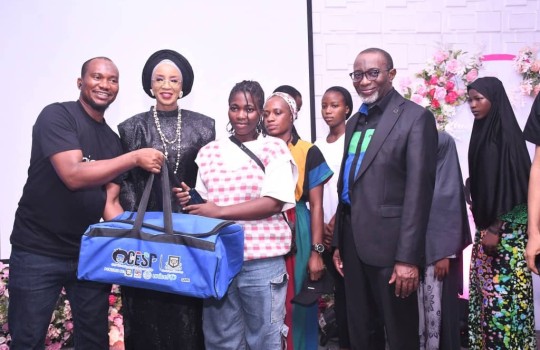Yaba College of Technology, in collaboration with the United Nations Children’s Fund (UNICEF), have empowered 200 girls with skills, global certification and startup Toolkits in digital core areas.
The programme came alive with optimism and pride as the 200 Girls Education and Skills Partnership (GESP) initiative, sponsored by UNICEF, was held at the Yusuf Grillo Auditorium of the college.
The transformative initiative equipping girl-child with globally relevant technical skills, entrepreneurial tools, and a direct path to financial independence was co-sponsored by UK Aid and Generation Unlimited.
Speaking as the special guest of honour at the event, the first lady of Lagos State, Dr Ibijoke Sanwo-Olu, represented by the wife of the Chairman, Ojodu, LCDA, Abimbola Odumbaku, emphasised the transformative power of girl-child education and the need to prepare girls not just to graduate, but to lead.
She described education as a powerful weapon for societal change and stressed the importance of combining technical skills with character, vision, and resilience.
Chairman, Governing Council, Yaba College of Technology, Prof. Funsho Afolabi, described the initiative as a shining example of leadership, education, and effective public-private partnership.
He praised the college’s preparedness for future transitions and called on alumni and stakeholders to support YABATECH’s ongoing endowment drive aimed at strengthening infrastructure and academic excellence.
The representative of UNICEF and Manager of Social Policy, Muhammed Okorie, lauded the initiative and its relevance in the development of the Nigerian girl-child.
According to him, “With Nigeria’s youth population projected to reach 190 million by 2030, there is an urgent need to expand skill-based programs that prepare girls for the modern workforce, more so, as nearly 74 per cent of Nigerian young adults currently lack the skills necessary for gainful employment”.
The Rector, Yaba College of Technology, Dr Ibraheem Abdul, encouraged the beneficiaries to see themselves as more than trainees but self-reliant and ready to make money.
He urged them to be entrepreneurs, problem solvers, and leaders, using their new skills to create and innovate.
Dr. Abdul emphasised that the world is waiting for their ideas and their impact.
The GESP event, he said, was not just a ceremony but a declaration that when girls are given the right training, support, and opportunity, they do not just participate in the future of work. They lead it.
The college GESP Project Coordinator, Dr. Funmilayo Doherty, noted that every toolkit given represents trust in the potential of these girls to change their homes, communities, and the broader tech ecosystem.
The GESP programme, she said, is part of a broader mission to close gender gaps in STEM, innovation, and employment by preparing adolescent girls for the future of work.
Dr Doherty said that the ceremony marked the completion of rigorous training in four key areas: web application development, mobile application development, computer systems and hardware support, and GSM repair and culminated in the presentation of startup toolkits and competency-based national certifications to all 94 beneficiaries.
She added that the initiative, executed within the framework of the National Skills Qualification Framework (NSQF), goes beyond classroom theory as the girls underwent a hands-on curriculum designed to promote innovation, industry readiness, and self-employment.
The NSQF Level 2 certificates awarded to the 94 graduates were validated through assessments involving observation, project delivery, and evidence collection, positioning the girls to enter the global workforce and to launch their own enterprises.
One of the highlights of the event was the presentation of fully equipped startup toolkits to all 200 girls.
These included laptops for participants trained in web and mobile development, repair kits for GSM technicians, and toolsets for graduates in computer systems and hardware repair.
These toolkits serve as both equipment and empowerment, offering practical assets that immediately position each recipient to begin working or building their own businesses.














